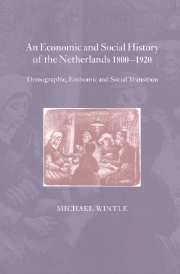 An Economic and Social History of the Netherlands, 1800–1920
An Economic and Social History of the Netherlands, 1800–1920 Book contents
- Frontmatter
- Contents
- List of plates
- List of figures
- List of tables
- Acknowledgements
- General introduction
- Part I Demography, and the health of the nation
- Part II Economic Transition
- 3 Economic performance and industrialization: the Dutch debate
- 4 Factor inputs: labour, capital, materials
- 5 Economic influences: entrepreneurship, technology, and government policy
- 6 Sectoral analysis
- 7 Features of demand
- 8 Economic transition: conclusion
- Part III Social transition: state, society, individual and nation
- General conclusion
- Bibliography
- Index
8 - Economic transition: conclusion
Published online by Cambridge University Press: 13 August 2009
- Frontmatter
- Contents
- List of plates
- List of figures
- List of tables
- Acknowledgements
- General introduction
- Part I Demography, and the health of the nation
- Part II Economic Transition
- 3 Economic performance and industrialization: the Dutch debate
- 4 Factor inputs: labour, capital, materials
- 5 Economic influences: entrepreneurship, technology, and government policy
- 6 Sectoral analysis
- 7 Features of demand
- 8 Economic transition: conclusion
- Part III Social transition: state, society, individual and nation
- General conclusion
- Bibliography
- Index
Summary
Summary of findings on the economy
In Part II we have approached the Dutch economy in the nineteenth century from a number of different angles. It is now time to draw the strands of these separate approaches together, first in a summary, and then in the form of some conclusions. The macro-economic performance of the area which is now the Kingdom of the Netherlands can be very favourably compared to its neighbours over the period of the nineteenth century. To some extent the Dutch were victims of their own success in the early modern period. In the province of Holland they had attained levels of GDP per capita in the second half of the seventeenth century which were on a par with those reached by England in 1820. A modest decline probably then took place, accelerating towards the end of the eighteenth century and especially during the French period, but the Dutch were still in the leading group of nations in the early nineteenth century, perhaps behind Britain, but level with or ahead of everyone else in Europe. From 1800 onwards we have the results of the project on the reconstruction of the national accounts, which generally confirm the balance of previous estimates: that growth was modest before 1850, but in line with the other leading economies of Europe. After 1850 the economic growth rates of the leading group of industrializing nations in North-West Europe took off, and the Dutch kept pace with them.
- Type
- Chapter
- Information
- An Economic and Social History of the Netherlands, 1800–1920Demographic, Economic and Social Transition, pp. 235 - 248Publisher: Cambridge University PressPrint publication year: 2000
